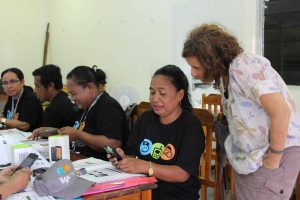My journey into the MET Program and ETEC 565A is from an unconventional flight path. I’m neither a teacher of children nor adults, or a technology specialist. Nevertheless, I’ve found education to be a core part of my work as an international public health specialist focussed in the areas of: community education, in-service training, management, policy advisor, and advocacy. My focus in health has cut across a wide spectrum including: reproductive and sexual health, maternal and child health, HIV/AIDS, smoking cessation, immunization, quality of care, social franchising and social marketing, behaviour change, participatory action research, and most recently digital health. In all of these aspects, education has been a core element; whether designing community education interventions, capacity building of teams and health providers, organisational development and managing organisational change, integration of evidence into policy, or leading structured (and less structured) workshops.
My journey into digital health in a low resource context has been particularly profound in a multitude of ways. Whilst I don’t jump on the bandwagon that technology will solve all the problems, which sadly is a growing mindset. At the same time, I’m very excited about the affordances of well-developed technological applications, for being able to do things at scale, with impact, cost-effectively, and at a level of quality that we could never have dreamed of previously. The dilemma in this space for me, is that the voice of technologists with their bells and whistles and magic bullets, sadly is increasingly speaking louder than the voices of health specialists. With shrinking financial resources and higher expectations of donors, the quick fixes of technocrats are more salient to donors, who rarely step foot in the field where their funds are being utilized. A website with automated project impact numerical updates, increasingly is adequate to make donors feel warm and fuzzy about doing ‘good’, irrespective of what’s happening on the ground. In educational theory it is well understood that individuals are different and need different approaches (Bates, 2014, p311); this is also true of: teams, organisations, communities, and nations; which all have different challenges needing different complex solutions, which need to be localized through meaningful engagement with different stakeholders. In my opinion, no one individual, organisation or discipline has the solutions and it is incumbent on us as 21st Century actors to recognise the values of collaboration across a multitude of stakeholders to solve complex problems. Sadly, in a development context, technological solutions (hardware or software) are increasingly becoming the focal point of solutions, they are ‘sexy’, and in my opinion, can even be compared to ‘my precious’ (for those who remember Gollum in the Lord of the Rings).
My personal vision for my participation in MET and more specifically ETEC 565 falls into four categories: reflection, understanding, developing skills, and evolving:
Reflection – I want to self-reflect on my past role as an educator. What have I done well? Where could I improve? For instance, I learnt in ETEC 512 that without knowing, the adult constructivist educational approaches that I’ve predominately used (ie situated learning and simulations) align well with good practice, although previously I wouldn’t have been able to articulate the evidence base for my choice (Brown, Collins, & Duguid, 1989). This new insight gives me confidence with the investments that I’ve been responsible to deliver on, and I feel it is especially incumbent upon us, who work in low resource contexts, to take time out to scrutinize our work and our impact. To do this reflection, I’ve taken a year off work to immerse myself in exploring new insights.
Understanding – I want to be more confident, evidence-based, and articulate in voicing my views in relation to digital solutions. As a health specialist, I feel that I don’t well understand the values, language, and theoretical models of the world of technology, and that puts me at a disadvantage when trying to make a case for, or against the use of technology. I feel especially disadvantaged when confronted with technologists who are good at ‘selling’ an easy fix-all solution.
Develop new skills – After more than twenty years in the developing world, I feel that I’ve become somewhat deskilled, and that I would like to learn more about the technological tools that could help me to strengthen my work and impact. The areas I’m particularly interested in, are the affordances of mobile phones in in-service training of health providers. The challenge of continuously training health providers seems insurmountable in low resource countries, with the World Health Organisation continuously updating protocols. The financial challenges of governments to provide ongoing in-service training coupled with the outdated protocols sitting on shelves accumulating dust, really saddens me. I can’t help thinking we could to better with tools like the Safe Delivery app. Simulations in virtual reality spaces also holds much promise. At the same time, I want to stay strongly grounded in local realities of a low resource context, and the enormous challenges of hardware and bandwidth; and I sincerely hope that I don’t get swept away with what is possible in a high resource context, and lose site of the vision that drew me to MET in the first place.
Evolve – In truth, having completed two Masters previously, I don’t need this degree for my career. My motivation in this respect is to add a new dimension to my toolbox coupled with my commitment to lifelong learning, by being exposed to new ideas and re-energized. I especially love plunging myself into a sector that is completely new, but still familiar, with a mix of seasoned experts as well as younger post-graduates who bring energy and passion and a ‘can do’ and ‘anything is possible’ mindset; and I hope the latter will keep me in check with some of my cynicism. My interest in MET is also driven, by wanting to evolve my career in new ways, allowing me to be more virtual, more flexible to work when and where I want, and to balance this against all the other fun parts of my life.

References
Bates, T., (2014) Choosing and using media in education: The SECTIONS model. In Teaching in digital age. Retrieved from https://opentextbc.ca/teachinginadigitalage/part/9-pedagogical-differences-between- media/
Brown, J. S., Collins, A., & Duguid, P. (1989). Situated cognition and the culture of learning. Educational Researcher, 18(1), 32-42.
The Safe Delivery App, Retrieved from http://www.maternity.dk/safe-delivery-app.
The Lord of the Rings [Video] Retrieved https://www.youtube.com/watch?v=Iz-8CSa9xj8

Hi Che,
I think it is really important to have the balance of the voice of the technologist as well as the voice of the health professional. Right technology for the right purpose and context is very important.
In IT, the success for any solution is determined by People, Processes and Technology. Often people only focus on the last aspect and forgetting that technology is only one part of the equation.
Thanks for sharing your post. I haven’t finished my draft but I enjoy seeing different approach, as I am busy listing technologies under different areas. But I like your four categories and I think those easily apply to us all. 🙂
cheers,
Sally